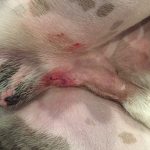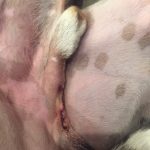Hello,
I’m not sure what your question is?
We have a 2 year old Jack Russell named Toby. Papers from the breeder say he is registered, but my guess is if we spent the money on a DNA test we would find a stranger in the midst. We love him and wouldn’t trade him for the world but we think he has an addiction! He was not handled by the breeder and probably didn’t know human touch other than when his tail was docked and dew claws removed as a pup until we bought him.
He seems as though he is now addicted to our touch. Any kind of touch. He loves scratches from anyone, anywhere, at any time, and if you stop scratching him, he whines non stop. Could this behavioral issue be due to the lack of early touch? As much as we love this lug, having our hands on him every waking moment isn’t feasible.
I would love to know what we can do to keep him occupied that doesn’t include belly rubs, butt scratches, and tickling his ribs non stop. He has toys he.plays with as well as two other Jack Russell’s to terrorize squirrels in the back yard with, so it’s not a lack of stimulation. Open to suggestions! Oh, and the breeder was breeding pit bulls in the same place with Russell’s and at 30+/- lbs, we are pretty sure dad, well you understand!
Thank you
Comments
My 5 year old English Setter has just barking viciously at my 15 year old dog They have gotten sling for the past four years but the past 2 evenings I’ve had to keep them separated. My old dog was just diagnosed with kidney disease.
Comments
Good morning Pawbly friends. Our old guy, Butch, is has been piddling often in the house. Not always- and he is not peeing. Just droplets have been escaping when he shakes or stretches getting up if he hasn’t been out for a bit. I am not surprised- he is in his late teens. We just grab a Lysol wipe and clean it up, no worries. Now, Occasionally feces has started to escape as well???? I only imagine it will start to happen more often. I feel bad for him- he looks so shameful when it happens. Any advice on doggie diapers? I don’t know that Butch will wear them, but if it gets worse and he still isn’t ready to leave us, I’d like to know what to look for. Thanks!!!
**also, my apologies for not replying where I can lately- I think there is a little glitch on this site that they are working out.????????
Comments
My 10 year old male Persian cat was blocked with a bladder infection.
One week ago, the Vet did a catherization to remove the fluids and sent him home.
He further recommended surgery to remove bladder stones. Is there an alternative to bladder surgery ?
Thank you.
Comments
Hi, my cat was diagnosed with hyperthyroidism about 2 weeks ago and our vet put her on Methimazole 5 mg liquid. Yesterday my cat started trying to urinate frequently (every couple of minutes) and defecated outside of her letterbox several times. I searched up to see if these were the symptoms of the medication and was unable to find anything online. So i just wanted to run it by you guys and double check. Today my cat seems to be doing well, she is not urinating every few minutes, however, I’m still a little worried. Thanks so much!
Comments
Hi! My dog has recently been licking around is butt and has completely licked off the hair on the back of his tail. He’s been doing it for about 2-3 weeks now. I thought it was the new food I tried with him but after seeing him do it for a few days, I stopped and went back to his original food. However, he has not stopped and now I’ve notice my other dog biting around her tail a little. Not nearly as bad as my male dog though. I am concerned something else is going on like worms. I unfortunately still owe a lot of money to my current vet for emergency visits the dogs had early this year and can’t afford to take them in to be checked. Can I try using Safe-Guard with them to see if that corrects the issue? Is something else possibly going on?
Comments
Hi there, I wanted to ask if polyps in the throat can be felt. My kitten that can’t meow I suspect of having polyps. The vet tested for Leukemia and FIV negative, xrays negative, and lung worm negative. Now I notice both sides of her neck has lump, one side bigger. My other kittens do not have these lumps. My vet said she doesn’t think it’s polyps because that’s uncommon in kittens, so $500 in tests later and I have no answers. Shouldn’t they have noticed these lumps? They are the size of a small marble.
Comments
I just recently got a 7 week old kitten. He was perfectly fine when I first got him but I don’t have a car so I was unable to get cat food but had some tuna in the cabinet. He seems really weak and sleeps all the time. I have since then gotten cat food but what should I do to get his strength back up? Is this something that I should be worried about?
Comments
Hi, my 4 year old adopted whippet was neutered on 4/22/20. I followed all post-op instructions and he was healing fine and resumed his normal activities at the two week point (May 6th), and was bathed on May 7th. They used dissolvable stitches, which I could still see on the area weeks after the surgery. Everything looked like normal healing, no redness/drainage/swelling, and he wasn’t bothering the area. Today (over a month since the surgery) I noticed him licking the area and upon inspection I noticed some redness and swelling at the incision site, and there is some minor serous drainage from the site. No change in behavior, no change in appetite or energy level. It doesn’t seem to be painful for him, but I’m worried since the incision area should be completely healed by now. Could this be a seroma or does it look like a bad infection (or something worse) that will require veterinary attention?
The first pic was taken today 5/30/20. The other pic was taken 4/26/20. Thank you in advance.
Comments
My pug just threw up and I am worried but the the clinic next to me is closed till Monday will he be okay he is also chasing his tail a lot but he has been eating and playing I am starting to worry I called his doctor and she said to wait till Monday because they are closed she also said it might be his anal glands but why is he vomiting












So, by feeding in to the whining, you’re reinforcing the behavior. At his age it will be difficult to stop. I’d reach out to your obedience trainer for ideas for this one.